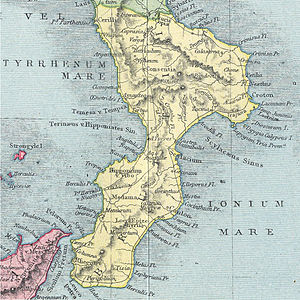Battle of Crotona
Coordinates: 39 ° 5 ′ 0 ″ N , 17 ° 7 ′ 0 ″ E
| date | 204 BC Chr. |
|---|---|
| place | Crotone , today's Calabria, in today's Italy |
| output | draw |
| Parties to the conflict | |
|---|---|
| Commander | |
|
Sempronius Tuditanus, Publius Licinius Crassus |
|
| Troop strength | |
| 4 legions | unknown |
Saguntum - Lilybaeum II - Rhone - Ticinus - Trebia - Cissa - Lake Trasimeno - Ager Falernus - Geronium - Cannae - Nola I - Nola II - Ibera - Cornus - Nola III - Beneventum I - Syracuse - Tarentum I - Capua I - Beneventum II - Silarus - Herdonia I - Upper Baetis - Capua II - Herdonia II - Numistro - Asculum - Tarentum II - New Carthage - Baecula - Grumentum - Metaurus - Ilipa - Crotona - Large fields - Cirta - Zama
The Battle of Crotona is an umbrella term for several battles between Romans and Carthaginians in Bruttium , today's Calabria , in 204 BC. Chr.
prehistory
After the Roman victory in the Battle of Metaurus in 207 BC. Chr. Hannibal had withdrawn with his army to Bruttium in the extreme south of Italy. The Roman Empire now appeared to be the clear winner of the Second Punic War .
In 205 BC One of the two Roman consuls, Publius Licinius Crassus , waged war against Hannibal, while the other consul, Publius Cornelius Scipio , prepared the crossing to Africa. Also in the following year Crassus stayed with his army in Bruttium, where one of the two consuls of that year, Publius Sempronius Tuditanus , was also employed.
The battles
At Kroton, today's Crotone , Tuditanus is said to have suffered a defeat against Hannibal. He then united his army with that of the proconsul Crassus. The tradition in the ancient sources for the battles of the last years of the war in Italy is contradictory.
The Carthaginians wanted an open field battle in which they would have been superior to the Romans, but Crassus repeatedly allowed his auxiliaries and horsemen to attack unexpectedly, which led to high losses among the Carthaginians and delayed their march. This was part of Scipio's plan: he wanted to stop Hannibal from the skirmishes of the land army. So he had time to take the fleet to North Africa. The losses on both sides were limited, rather the country was devastated by the marches and looting of the civilian population. After almost a year of fruitless fighting, the Roman army withdrew.
consequences
Hannibal got ready to pursue him, but then he received news of Scipio's landing on the North African coast and the threat to the city of Carthage . He then drove with his army to the coast of what is now Tunisia . The Second Punic War in Italy ended with the battles of Crotona.
swell
- Titus Livius : From urbe condita 29.
literature
- Brian Caven: The Punic Wars . Weidenfeld and Nicolson, London 1980, ISBN 0-297-77633-9 .
- Terence Wise, Richard Hook: Armies of the Carthaginian wars. 265-146 BC Osprey, London 1982 et al. ö., ISBN 0-85045-430-1 , p. 30f.
